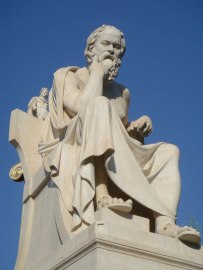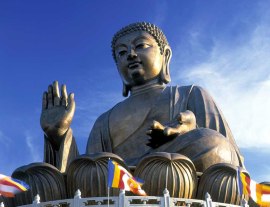((Philosophy)) is a ((Path of Happiness))
by Jason Kunen
I recently saw a play called Philosophy for Gangsters, where it was suggested that philosophy and happiness have nothing to do with each other. After hearing this, I thought for some time about this topic. Does philosophy lead to happiness? Is there a connection?
Philosophy is the “love of Sophia,” meaning wisdom Let us inquire into these two terms. ((Wisdom)) may perhaps best be suggested as understanding the nature of ((Reality)), in other words, seeing the truth of ((what is)) in the moment. Love, not /exclusive/ or /possessive love/, but ((real love)) seems to be a ((total absorption)) with something, such that no /divisions/ or /separateness/ exists between one and the other.
We may not necessarily even be speaking of romantic love, but ((love)) in general. Imagine for example, the martial artist who becomes absorbed in his or her practice, or the athlete that loses his sense of self on the field such that there is just movement, or the musician who is lost in the music. A sense of /self/ disappears, and there is only ((action)). The kind of love which we speak is unconditional; there is no separation between /one/ and the /other/ on any level, but a complete and total ((union)).
((Philosophy)) therefore would mean a ((total absorption and understanding into what is)), i.e., ((the nature of reality)).
Through ((wisdom and love)), we break through the /illusion of separation/. ((Seeing)) that there is no /separation/ is already the flowering of ((love)). Thus, ((wisdom-and-love)), ((truth-and-compassion)), are interconnected and co-arise.
As we said in previous articles, an “I” appears to exist because of memories and sensations. However, if we look closely with sensitivity and awareness, we can see that it is thought that creates a thinker. The narrative we tell ourselves everyday is an illusion, perpetuated by thought in order to preserve a sense of continuity. This separation between the thinker and the thought, the experiencer and the experienced, creates conflict and divisions within us.
Since thought operates only in the past and projects the future, there is a conflict between what should be (according to thought), and what is. This /self/, the /ego/, projects all kinds of labels, categories, divisions, and judgments on reality and experience. As we can never escape from the present, from what is, we lead a double life: experiencing what is, and what we think should be according to our desires, thoughts, conditionings, and memories.
In order to define itself, thought creates labels, judgments, and all kinds of divisions. This causes us to objectify all experience, people, relationships, language, and reality, and view as /other/ anything which does not fit our own definition. The /ego/ operates in an /I—It/ technology of mind. ((Wisdom-and-love)), brought to Life through ((Living Philosophy)), creates a shift from /I—It/ to ((I==Thou)), whereby objectifying habits are dropped, and there is insight in the ((Sacredness)) and ((Interrelatedness)) of all things.
Without any /divisions/ or /separateness/, there is no inward conflict, for conflict can only exist between /one/ and an /other/. Without conflict, there is not only ((clarity)), but ((order)). In this sense, ((order)) is not forced, disciplined, or adherence to some moral law, but is a natural spontaneity that is in itself ((ethical, creative, and harmonious)). For the one who embodies ((love-and-wisdom)), he or she would not even consider /violence/ or /actions/ that would harm others, for they are ((aware)) of the ((interconnectedness of all things)). Order seemingly brings about virtue and goodness then, and these give rise also to harmony. Of course, we must keep in mind that these ((qualities)) such as order, virtue, wisdom, love, etc., do not arise in a linear or cause-and-effect manner, but also ((co-arise)) together, and are ((interrelated)).
Therefore, if there is no /self/ in conflict or that is /divided/, but simply the ((manifestation)) and ((action)) of these ((qualities)), would this not be happiness? For the very /pursuit/ of happiness obstructs its flowering, because there is a pursuer and the pursued. But without that conflict, and just the ((total absorption and flowing into what is)), ((the present moment)), there is bliss.
Thus, ((Philosophy)), not intellectual jargon, debates, and complex theories, but real ((Living Wisdom)) is the key to ((Happiness)) and ((Human Flourishing)). This ((meditative intelligence)), the ((understanding and awareness)) of ((what is)) is ((Living Philosophy)). ((Philosophy)), therefore, is a ((Way of Liberation)). It is not a path “towards” happiness, as that would create a division between the path and a goal, but rather, ((Philosophy)) is a ((Path of Happiness)).
Related Articles:
The Game of Life – Don’t Take it Personally
Making the Ordinary Extraordinary
Link to my book – Meditations on Zen and Martial Arts Philosophy
Link to my other essays – http://papers.ssrn.com/sol3/cf_dev/AbsByAuth.cfm?per_id=1837756
Navigating the Mazeway: Fulfilling our Best Possibilities As Individuals and As a Society, by Tony Parrotto
That Which Is, by Martha Randolph and Elizabeth Campbell

